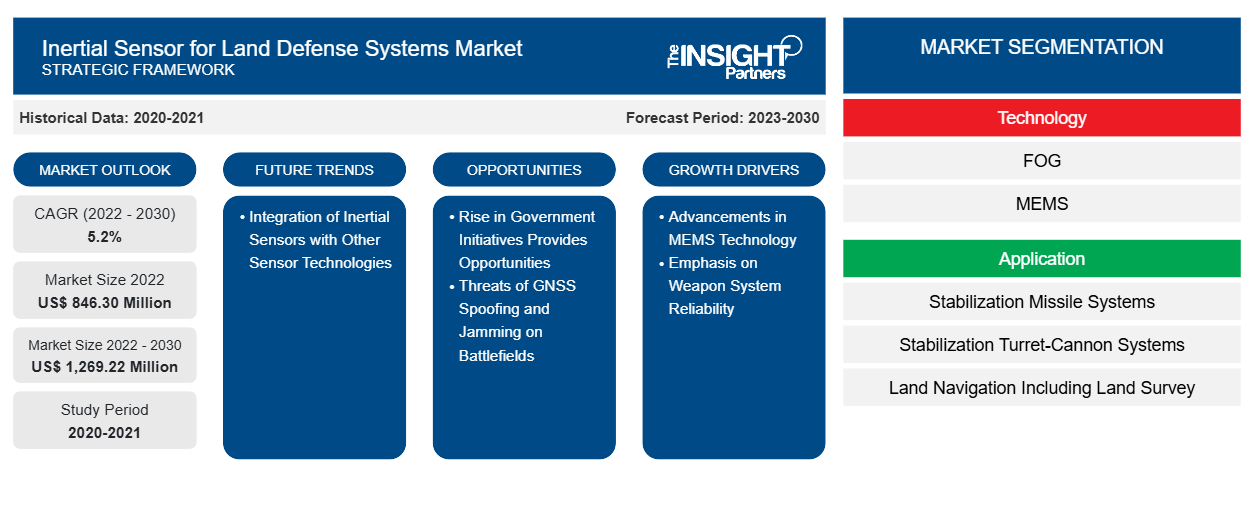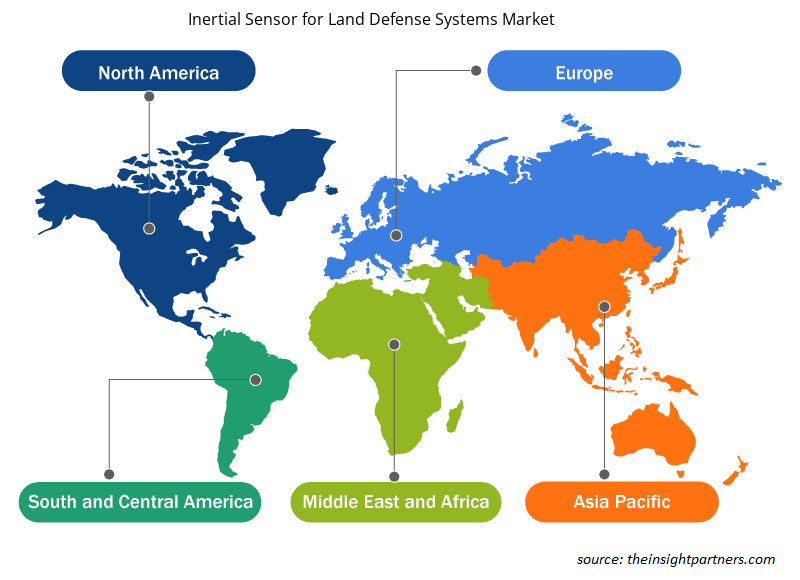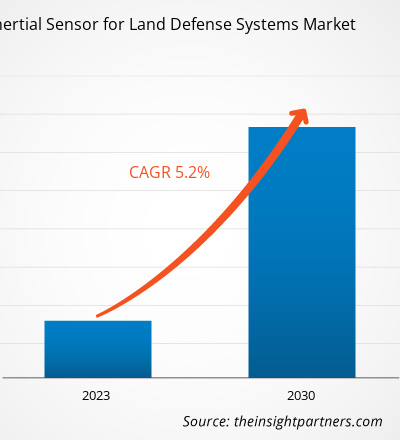[研究报告] 陆地防御系统惯性传感器市场规模预计将从 2022 年的 8.463 亿美元增至 2030 年的 12.6922 亿美元;预计 2022 年至 2030 年的复合年增长率为 5.2%。
该报告根据当前陆地防御系统惯性传感器的市场趋势以及影响市场增长的驱动因素,介绍了其增长前景。
分析师观点:
武器系统的可靠性和精确度在陆地防御中至关重要,这可以通过使用惯性传感器来实现。通过精确测量武器系统的特定力和角速率,这些传感器提供实时数据,有助于保持系统的稳定性和准确性。惯性传感器应用于各种陆地防御系统,包括火炮系统、导弹制导系统、无人地面车辆 (UGV) 和自主武器平台。这些传感器为导航稳定和其他目标定位目的提供关键数据,从而提高这些系统的整体性能和可靠性。因此,对武器系统可靠性的重视正在推动陆地防御系统对惯性传感器的需求,从而推动陆地防御系统惯性传感器市场的发展
陆地防御系统惯性传感器市场概述:
惯性传感器,也称为惯性导航系统 (INS),使用加速度计和陀螺仪来确定航天器相对于惯性系统的姿态。这些传感器包括尺寸仅为几毫米的微机电系统(MEMS) 惯性传感器,以及尺寸高达 50 厘米的高精度环形激光陀螺仪。微机电系统 (MEMS) 的进步对惯性传感器的小型化、成本降低和性能提升产生了重大影响。MEMS 设备在设计和开发军用传感器以满足特定任务要求方面可以发挥关键作用。由于 MEMS 功耗低、尺寸小、可靠性超高,最适合开发用于战场坦克、敌方领土监视、无人机电子设备、隐蔽通信、无人驾驶飞行器(UAV) 和用于击落敌方目标的导弹的传感器。
武器系统的可靠性和精确度对陆地防御至关重要。政府越来越多地将无人驾驶车辆用于各种防御应用,这为将惯性传感器集成到陆地防御系统中创造了重大机遇。此外,战场上全球导航卫星系统 (GNSS) 欺骗和干扰的威胁推动了惯性导航系统的采用。这些威胁可能严重影响军事行动,因此需要可靠且高性能的惯性导航系统。这些因素正在推动陆地防御系统惯性传感器市场的发展。
定制此报告以满足您的需求
您可以免费定制任何报告,包括本报告的部分内容、国家级分析、Excel 数据包,以及为初创企业和大学提供优惠和折扣
陆地防御系统惯性传感器市场:战略洞察

-
获取此报告的关键市场趋势。这个免费样品将包括数据分析,从市场趋势到估计和预测。
陆地防御系统惯性传感器市场驱动因素:
MEMS 技术的进步将推动陆地防御系统惯性传感器市场的增长
微机电系统 (MEMS) 是指在微观尺度上制造带有移动机械部件的微型传感器、执行器和换能器。MEMS 技术在陆地防御系统惯性传感器中的应用扩大了其应用范围。MEMS 技术能够在微观尺度上生产惯性传感器,从而可以将其集成到较小的陆地防御系统中,例如无人地面车辆和士兵佩戴的设备。此外,MEMS 技术的采用降低了传感器制造成本,使惯性传感器更易于获得且价格更实惠。基于 MEMS 的惯性传感器具有卓越的性能特征,包括高灵敏度、准确性和稳定性,增强了其在陆地防御系统中进行精确运动感应和导航的适用性。例如,2023 年 9 月,航空航天和国防工业惯性导航解决方案的领先供应商 EMCORE Corporation 宣布推出 TAC-440 MEMS 惯性测量单元 (IMU)。这款 IMU 被公认为世界上最小的 1°/小时 IMU,采用不到 5 立方英寸的超紧凑封装。此外,TAC-440 旨在成为霍尼韦尔 1930 和 4930 IMU 的高性能替代品,提供更好的外形、贴合度和功能兼容性。
总体而言,EMCORE 公司推出的 TAC-440 MEMS 惯性测量单元代表了惯性导航技术领域的重大进步。其体积小、成本效益高、性能提升、集成可能性和大规模生产能力使其成为各种陆地防御应用的宝贵资产。MEMS 技术还能够在单个芯片上集成多个传感器,提供多轴运动传感功能。此外,MEMS 技术的大规模生产能力极大地促进了惯性传感器在陆地防御系统中的广泛应用。因此,MEMS 技术的进步对惯性传感器的小型化、成本降低和性能提升产生了重大影响,从而推动了陆地防御系统惯性传感器市场的发展。
陆地防御系统惯性传感器市场报告细分和范围:
“陆地防御系统惯性传感器市场分析”考虑了以下几个部分:技术、应用和地理。根据技术,市场细分为 MEMS、FOG 等。在应用方面,市场细分为稳定主动防护系统、稳定炮塔/加农炮系统、稳定导弹系统、稳定光电系统、导弹 GGM/SSM、陆地导航(包括陆地测量)等。根据地理,陆地防御系统惯性传感器市场细分为北美、欧洲、亚太地区、中东和非洲以及南美。
陆地防御系统惯性传感器市场细分分析:
根据应用,陆地防御系统惯性传感器市场细分为稳定主动防护系统、稳定炮塔/大炮系统、稳定导弹系统、光电系统稳定、导弹 GGM/SSM、陆地导航(包括陆地测量)等。预计到 2030 年,稳定导弹系统部门将在陆地防御系统惯性传感器市场中占据重要份额。惯性传感器在导弹系统的稳定中起着至关重要的作用。这些传感器是惯性导航系统 (INS) 的一部分,惯性导航系统是一种导航设备,它使用运动传感器(加速度计)和旋转传感器(陀螺仪)不间断地计算移动物体的位置、方向和速度,而无需外部参考。惯性传感器用于稳定导弹中的传感器系统。通过测量导弹的运动和旋转,传感器有助于补偿高旋转运动并保持传感器系统的稳定性。这种稳定对于准确的目标跟踪、监视和导弹制导至关重要。惯性传感器用于实现导弹系统中的高精度导航。它们提供导弹角速度和加速度的精确测量,这对于制导和控制功能至关重要。例如,需要精确的惯性参考系统来稳定目标视线测量,以便计算导弹制导命令。在某些导弹系统中,使用新型半捷联稳定平台 (SSP) 来安装传感器。该平台隔离了导弹的高旋转运动,降低了传感器的射程要求并实现了高精度导航;因此,这些因素推动了陆地防御系统惯性传感器市场的增长。
陆地防御系统惯性传感器市场区域分析:
亚太地区陆地防御系统惯性传感器市场细分为澳大利亚、中国、印度、日本、韩国和亚太地区其他地区。中国在亚太地区陆地防御系统惯性传感器市场中占有最大的份额。该地区的陆地防御系统惯性传感器市场正在经历大幅增长。亚太地区 (APAC) 拥有世界上一些最强大的军队,其中一些国家在其陆地防御能力方面投入了大量资金。亚太地区的各国军队都在投资现代武器系统,例如远程导弹、精确制导弹药、网络战能力和其他军事项目。例如,2020 年 7 月,印度拨款 52 亿美元用于设计和开发军事装备。国防部宣布,批准的提案涉及从国内国防工业公司收购价值 41 亿美元的资产。此外,2023年12月,美军宣布将于2024年在印太地区部署中程地基导弹,建立冷战结束以来美在该地区的第一个导弹库,以加强对中国的威慑。
陆地防御系统惯性传感器市场关键参与者分析:
陆地防御系统惯性传感器市场预测可以帮助利益相关者规划其增长战略。柯林斯航空航天、Advanced Navigation Pty Ltd、霍尼韦尔国际公司、Aeron Systems Pvt Ltd、诺斯罗普·格鲁曼公司、SBG Systems SAS、Thales SA、Emcore Corp、GEM Elettronica SRL 和 Exail SAS 是陆地防御系统惯性传感器市场报告中介绍的知名参与者。此外,在研究过程中还研究和分析了其他几家参与者,以全面了解市场及其生态系统。
陆地防御系统惯性传感器市场区域洞察
Insight Partners 的分析师已详细解释了预测期内影响陆地防御系统惯性传感器市场的区域趋势和因素。本节还讨论了陆地防御系统惯性传感器市场的各个部分和地理位置,包括北美、欧洲、亚太地区、中东和非洲以及南美和中美洲。

- 获取陆地防御系统惯性传感器市场的区域特定数据
陆地防御系统惯性传感器市场报告范围
| 报告属性 | 细节 |
|---|---|
| 2022 年市场规模 | 8.463亿美元 |
| 2030 年的市场规模 | 12.6922亿美元 |
| 全球复合年增长率(2022 - 2030 年) | 5.2% |
| 史料 | 2020-2021 |
| 预测期 | 2023-2030 |
| 涵盖的领域 |
按技术分类
|
| 覆盖地区和国家 |
北美
|
| 市场领导者和主要公司简介 |
|
陆地防御系统惯性传感器市场参与者密度:了解其对业务动态的影响
陆地防御系统惯性传感器市场正在快速增长,这得益于终端用户需求的不断增长,这些需求源于消费者偏好的不断变化、技术进步以及对产品优势的认识不断提高等因素。随着需求的增加,企业正在扩大其产品范围,进行创新以满足消费者需求,并利用新兴趋势,从而进一步推动市场增长。
市场参与者密度是指在特定市场或行业内运营的企业或公司的分布情况。它表明在给定市场空间中,相对于其规模或总市场价值,有多少竞争对手(市场参与者)存在。
在陆地防御系统惯性传感器市场运营的主要公司有:
- 柯林斯航空航天
- 先进导航有限公司
- 霍尼韦尔国际公司
- Aeron 系统私人有限公司
- 诺斯罗普·格鲁曼公司
免责声明:上面列出的公司没有按照任何特定顺序排列。

- 获取陆地防御系统惯性传感器市场顶级关键参与者概览
陆地防御系统惯性传感器市场最新发展:
陆地防御系统惯性传感器市场中的公司普遍采用并购等无机和有机战略。根据公司新闻稿,以下是一些最新关键发展:
- 2023 年 9 月,全球公认的机器人和导航技术人工智能 (AI) 领导者 Advanced Navigation 在 UTS Tech Lab 开设了最先进的机器人工厂。该工厂位于新南威尔士州的 Botany,旨在扩大 Advanced Navigation 的生产能力,特别是针对其为 GPS 拒绝环境设计的突破性 AI 导航系统。值得注意的是,这包括他们被称为 Boreas 的尖端数字光纤陀螺仪 (DFOG) 技术。
- 2023 年 9 月,EMCORE 公司发布了一项重要公告,宣布推出 TAC-440 MEMS 惯性测量单元 (IMU),这是世界上最小的 IMU,精度高达 1°/小时。TAC-440 的设计非常紧凑,体积不到 5 立方英寸,是一种卓越的选择,可与霍尼韦尔 1930 和 4930 IMU 的外形、贴合度和功能无缝衔接,从而提供增强的性能。此次发布彰显了 EMCORE 致力于提供行业领先的尖端解决方案的承诺。
- 2023 年 5 月,SBG Systems 推出了 Ekinox Micro,这是一款最先进的紧凑型 GNSS 辅助惯性导航解决方案,专为任务关键型应用而设计。这项尖端技术的特点是体积小巧、性能卓越,是精确可靠导航至关重要的苛刻场景的理想选择。通过集成高性能 GNSS 和惯性传感器,Ekinox Micro 提供无与伦比的精度和稳定性,即使在具有挑战性的环境中也能确保最佳导航性能。
- 历史分析(2 年)、基准年、预测(7 年)及复合年增长率
- PEST和SWOT分析
- 市场规模、价值/数量 - 全球、区域、国家
- 行业和竞争格局
- Excel 数据集
近期报告
相关报告
客户评价
购买理由
- 明智的决策
- 了解市场动态
- 竞争分析
- 客户洞察
- 市场预测
- 风险规避
- 战略规划
- 投资论证
- 识别新兴市场
- 优化营销策略
- 提升运营效率
- 顺应监管趋势






















 获取免费样品 - 陆地防御系统市场惯性传感器
获取免费样品 - 陆地防御系统市场惯性传感器